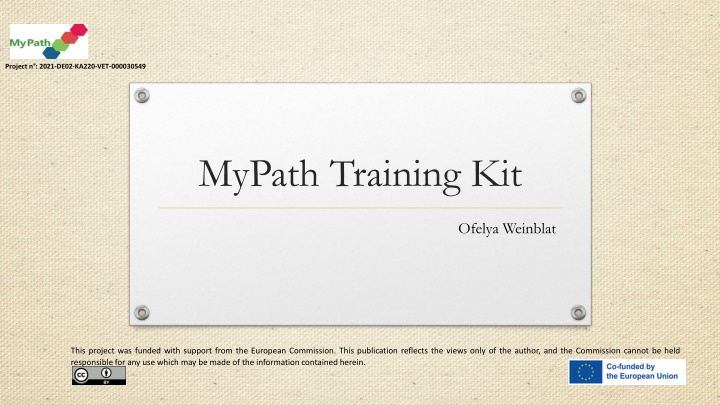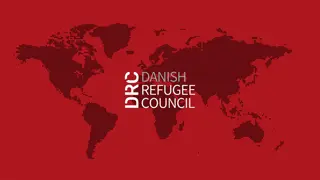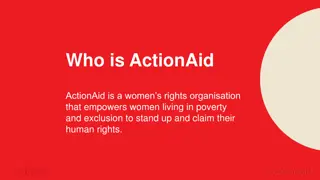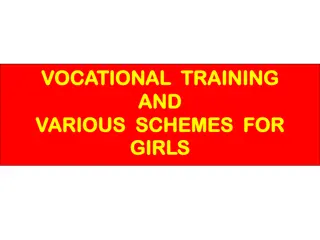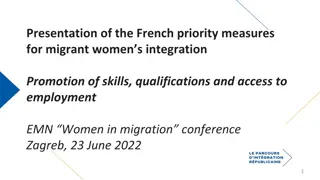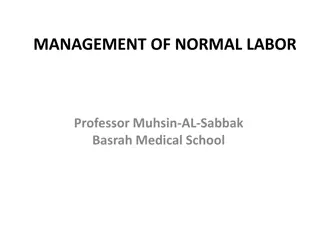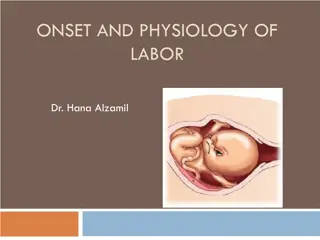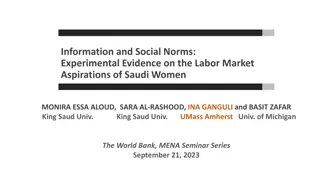Empowering Women in Labor Market Integration
Women with migration, refugee, and ethnic minority backgrounds face unique challenges in integration and the labor market. This project funded by the European Commission aims to provide innovative methods through a Training Kit to empower these women for success. The Kit includes assessment tools, career development models, emotional intelligence skills, and cognitive skills improvement strategies. Explore solutions for childcare challenges faced by migrant women like Leila through various options such as public childcare facilities, flexible work arrangements, and community support programs.
Download Presentation

Please find below an Image/Link to download the presentation.
The content on the website is provided AS IS for your information and personal use only. It may not be sold, licensed, or shared on other websites without obtaining consent from the author.If you encounter any issues during the download, it is possible that the publisher has removed the file from their server.
You are allowed to download the files provided on this website for personal or commercial use, subject to the condition that they are used lawfully. All files are the property of their respective owners.
The content on the website is provided AS IS for your information and personal use only. It may not be sold, licensed, or shared on other websites without obtaining consent from the author.
E N D
Presentation Transcript
Project n: 2021-DE02-KA220-VET-000030549 MyPath Training Kit Ofelya Weinblat This project was funded with support from the European Commission. This publication reflects the views only of the author, and the Commission cannot be held responsible for any use which may be made of the information contained herein.
Introduction Women with migration, refugee, and ethnic minority background face unique challenges in integration and the labor market. Purpose of the Kit: Provide innovative methods for training these women to empower them for success.
Overview of the Training Kit The 4 Blocks Assessment Tools and Checklists Models for Career Developing Labour Market Related Skills and Competences Models for Emotional Intelligence Developing/Improving Cognitive Skills Assesses participants' backgrounds, qualifications, and expectations. Enables trainers to customize training according to individual needs. Tracks the progress and ensure comprehensive training coverage.
Block 1 - Models for Career Developing Objective: Equip participants with strategies and models to navigate and succeed in their professional journeys. Paradigms for career progression Analysis of job markets & suitable careers based on qualifications Confidence-building exercises Role-playing real-world career scenarios
Childcare Challenges and Potential Solutions Leila is a migrant from Turkey who has recently moved to Germany. She has a vocational education, fitting within levels 3-5 of the EQF. However, she faces a significant challenge: finding reliable and affordable childcare for her 3-year-old son, especially considering the cultural differences and her unfamiliarity with the German system. Government Programs, Community Initiatives, "Workplace Provisions, etc.
Path to Problem Solution Models Public Childcare Facilities (Kitas) Tagesmutter (Day Mothers) Flexible Work Arrangements Integration and Support Groups Childcare Vouchers or Financial Support Home Country Networks Raise awareness Online Platforms & Apps Language and/or Cultural training
Block 2 - Labour Market Related Skills and Competences Objective: Crucial skills and knowledge necessary to succeed in the modern labor market. Understand the demands and trends of the EU labor market Soft skills and competencies in today's job market Simulated job market scenarios Workshops on digital skills and tools relevant for job roles
Path to Professional Integration Leila, a 32-year-old woman from Syria, has received vocational training as a nurse in Syria, EQF 4. After relocating to Germany with her children, she aspires to continue her career in nursing.
Skill Gap Analysis Lena's Current Skills (based on Syrian VET) Required Skills for German Nurses Advanced wound care and sterile procedures Basic wound care Administering a wide range of medications, including IV drugs Administering oral and injectable medications Using digital devices to monitor vital signs Monitoring vital signs manually Documenting patient information in German using medical software Documenting patient information in Arabic Communicating with patients and families in Arabic Communicating with patients, families, and colleagues in German Basic knowledge of common diseases and treatments Knowledge of European healthcare standards and protocols Working in high-stress environments Working in a multi-disciplinary team Basic first aid procedures Advanced life-saving procedures and protocols Adherence to German healthcare laws and privacy regulations
Bridging each identified gap Specific skills, e.g. digital or language proficiency. Potential mentors that can guide. Local German institutions or organizations that offer supplementary courses. Local centers that might provide on-the-job training or internship opportunities.
Block 3 - Models for Emotional Intelligence Objective: Empower participants to understand and manage their emotions, helping them to communicate effectively and build strong professional relationships. The importance of emotional intelligence in the workplace Recognizing emotional triggers and reactions Group activities to practice empathy and effective communication Personal Story Sharing Emotional Vocabulary Expansion Empathy Walk Exercises for self-awareness and self-regulation Stress Management such as cultural-aware meditation, multicultural, and inclusive relaxation exercises Role-Playing Activity A personal EI development plan
Handling Emotional Labyrinth Emotional Scenarios Reactions Defensiveness Seeking clarification Avoidance Asking for support Taking a moment to breathe & process Expressing feelings calmly Leila feels isolated during her breaks as her colleagues talk in GE and she struggles to join the conversation. A patient refuses her assistance due to her migrant background. She faces a stressful situation where a patient's condition deteriorates rapidly, and she needs to communicate with a German-speaking doctor. A coworker makes a casual but culturally insensitive joke.
Block 4 - Developing/Improving Cognitive Skills Objective: Enhance the cognitive abilities of participants, making them more agile thinkers and problem solvers. Overview of essential cognitive skills for modern jobs The correlation between cognitive skills and job performance Problem-solving exercises and interactive activities to sharpen critical thinking and decision- making skills Sound Story to improve auditory processing. Memory Chain to enhance working and long-term memory. Logical Puzzles to promote logical thinking. Problem Box to practice problem-solving. Creative Sculpture to stimulate cognitive creativity.
